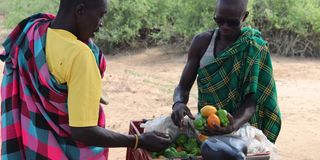Reformed Turkana bandits fighting hunger through irrigation

Mr James Ereng, a reformed bandit selling farm produce from his farm to a customer within Lolupe village in Loima Sub-County.
Reformed bandits in Turkana County are taking the lead in fighting hunger by embracing irrigated farming.
A prolonged drought in the region has forced many to migrate to neighbouring Uganda and South Sudan, where they risk being killed in the scramble for limited pasture and water.
James Ereng, a reformed warrior from Lolupe village in Loima sub-county, notes that with erratic rainfall and shrinking sizes of grazing fields caused by land-use changes, most men are pushed to become warriors to access new grazing fields or risk losing all their livestock.
“To be safe and be able to provide for our families, we have to embrace farming as relief food is unreliable,” he told the Nation.
County authorities say more than 600,000 people are facing starvation as a result of the drought.
"Due to inability to dictate quantities, type of food to be donated and for how long, we had to produce our food through irrigation," Mr Ereng said.
This is after PanAfricare drilled a borehole in the village to provide water for household use and farming.
The now developed Lolupe farm that was first established by the county government is dotted with several nutritious crops that include amaranth, cowpeas, collard greens and spinach.
"PanAfricare, guided by our needs, came to our rescue by expanding the one-acre piece of land to 7.5 acres, drilled a borehole that provides adequate water during the dry spell and has assisted us in ploughing and providing farm inputs," Mr Ereng said.
The crops also act as fodder for their livestock during harvesting as he sells some to earn an income.

Mr James Ereng, a reformed bandit at his Lolupe village farm in Loima Sub-County attending to tomato crops.
Though he is clad as a warrior with a shuka, a wrist knife and a traditional stool, Ereng says that embracing farming because a reliable source of water is available enables him to easily fend for his family as he doesn't have many livestock to force him to migrate to Uganda anymore.
His valuable possessions are now pangas and jembes, not spears, arrows or illegal guns, as was the case in the past.
Mathew Lokwawi, another aggressive and motivated farmer in Katilu village, is among 30 farmers at Israel Farm near the River Turkwel who work daily on their allocated pieces of land in the hot scorching sun, a sacrifice that is paying off.
He says they have received high-value horticultural and nutritious seeds from PanAfricare that include onions, kales, tomatoes, spinach, capsicum, cowpeas, spider plant, black night shades and amaranth after being trained on good agricultural practices.
"All members produce enough food for their families and the surplus is sold at nearby centres. Last week, I harvested 20 crates of tomatoes from one and a half acres that I sold for Sh2,500 per crate," Mr Lokwawi said.
He reinvests the profits into the farm to boost earnings, which he uses to pay for school fees for his children.
At least 880 farmers in Katilu and Turkwel wards are benefiting from agricultural activities.





